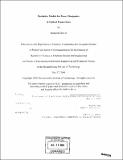Predictive models for power dissipation in optical transceivers
Author(s)
Butler, Katherine, 1981-
DownloadFull printable version (9.463Mb)
Alternative title
component perspective on energy efficiency of optical networks
Other Contributors
Massachusetts Institute of Technology. Dept. of Electrical Engineering and Computer Science.
Advisor
Rajeev Ram.
Terms of use
Metadata
Show full item recordAbstract
Power dissipation in optical networks is a significant problem for the telecommunications industry. The optical transceiver was selected as a representative device of the network, and a component based power model is developed for it. This model indicates that there are three key power dissipating elements in an optical transceiver: the electrical MUX/DEMUX, the thermoelectric cooler (TE cooler), and the modulator driver amplifier. First, the electrical MUX/DEMUX materials and functionality are investigated, and a circuit model is developed to simulate the MUX/DEMUX using both CMOS and MOSFET Current Mode Logic circuit topologies. The SPICE simulations use future technology generation process cards from the Berkeley Predictive Technology model, and enable the simulations to predict the power dissipation of the MUXs in the future. The results of these SPICE simulations show that improvement in technology generations significantly reduces the power dissipation of the MUX circuits. The TE cooler is then examined and a MATLAB model is developed to predict the thermodynamic flow through a packaged laser and TE Cooler. The MATLAB simulations of this model show that although materials with lower thermal conductivity result in more cooling power for the TE cooler, they also significantly raise the overall temperature of the laser. Therefore, lower thermal conductivity is not the best way to reduce power dissipation in the TE cooler. Together these physical models give a better understanding of the factors that will most influence the power dissipation optical transceivers in the future.
Description
Thesis (M. Eng.)--Massachusetts Institute of Technology, Dept. of Electrical Engineering and Computer Science, 2004. Includes bibliographical references (p. 101-103).
Date issued
2004Department
Massachusetts Institute of Technology. Department of Electrical Engineering and Computer SciencePublisher
Massachusetts Institute of Technology
Keywords
Electrical Engineering and Computer Science.